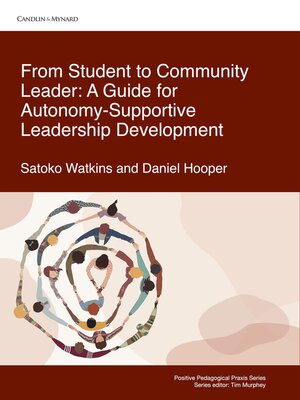From Student to Community Leader
ebook ∣ A Guide for Autonomy-Supportive Leadership Development
By Satoko Watkins

Sign up to save your library
With an OverDrive account, you can save your favorite libraries for at-a-glance information about availability. Find out more about OverDrive accounts.
Find this title in Libby, the library reading app by OverDrive.



Search for a digital library with this title
Title found at these libraries:
| Library Name | Distance |
|---|---|
| Loading... |
This book provides a guide for autonomy-supportive leadership training, which is not limited to language learning but can be applied to any field where learners become empowered leaders. The principles and activities featured in this book aim to foster and sustain student-led learning communities that prioritize learners' well-being, ensure everyone's voice is heard, and build a positive emotional climate conducive to learning. The authors believe that autonomy-supportive leadership training sets a positive cycle in motion, empowering student leaders in the present and continuing to inspire future generations of learners.
Who is this book for?
The book aims at anyone striving to facilitate students' leadership development in an autonomy-supportive manner, as well as possibly the students themselves. Being a student facilitator is not based on where you work, whom you work with, or what learning students are engaged in. Instead, a student facilitator (who can be an educator or a student) empowers learners to be leaders by promoting autonomy-supportive principles and practices. A student facilitator might be a teacher, advisor, administrator, or student hoping to cultivate student leadership. This might be in the context of interest-based learning communities, circles, sports teams or volunteer groups. Or you might be supporting student workers and event organizers. Whichever kinds of student groups you work with, the concepts in this book, such as communities of practice, basic psychological needs, and leadership styles, have been widely applied in many fields and are just as applicable to student groups.
Why should you read this book?
As the authors write in the introduction, "autonomy-supportive leadership support does not simply build successful language learners, but rather future leaders who can positively contribute to any field they enter." We invite you to set a chain reaction in motion to create a positive learning climate that prioritizes individuals' well-being and cultivates their potential for making positive contributions to the world.







